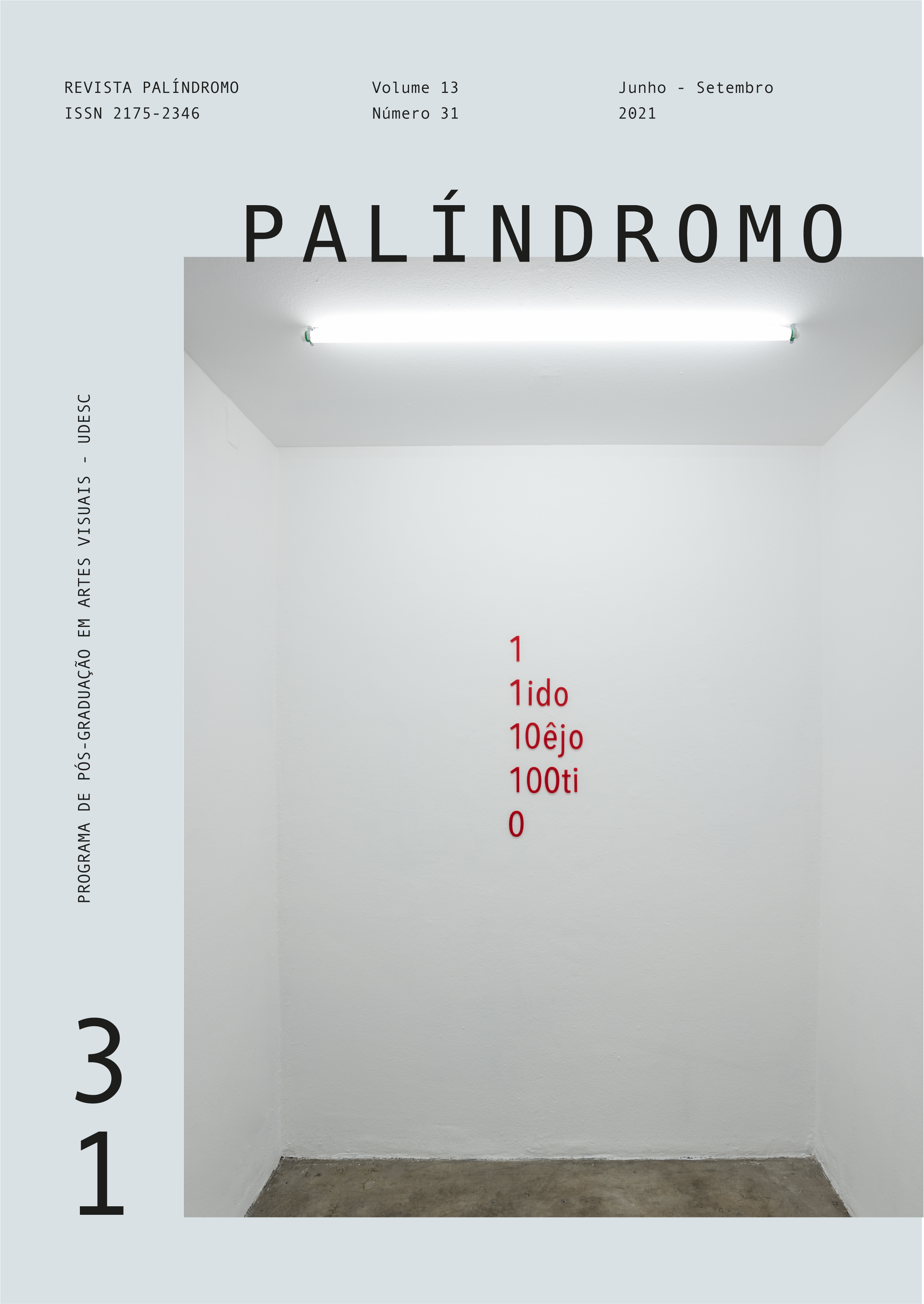Entre na escrita: uma questão de desvio
DOI:
https://doi.org/10.5965/2175234613312021058Palavras-chave:
escrita de artista, desvio, derivaResumo
O texto reflete sobre alguns princípios da escrita de artista no âmbito acadêmico, enfatizando a importância de mobilizar o meio, compreendido aqui como uma noção em que deslizamentos entre início e fim, teoria e prática, eu e outro, clareza e obscuridade, determinações e indeterminações, contornos e inacabamentos surgem com o intuito de acompanhar os movimentos do pensamento. O desvio e a deriva aparecem como apostas de uma metodologia que não chega a constituir uma lógica ou um sistema rígido e, por isso mesmo, figuram, paradoxalmente, como uma espécie de princípio desordenado visando a escrita capaz de promover uma experiência e dialogar com os movimentos oblíquos do processo artístico.
Downloads
Referências
ALVAREZ, Carlos Mario. Nietzsche e a experiência do filósofo-artista. 2012. 201 p. Tese (Doutorado em Letras) – Pontifícia Universidade Católica do Rio de Janeiro, Rio de Janeiro, 2012.
BENVENISTE, Émile. A natureza dos pronomes. In: BENVENISTE, É. Problemas de linguística geral I. Trad. Maria da Glória Novak; Maria Luisa Neri. Campinas: Pontes, 1995.
BLANCHOT, Maurice. A questão mais profunda. In: BLANCHOT, Maurice. A conversa infinita I: a palavra plural. Trad. Aurélio Guerra Neto. São Paulo: Escuta, 2001.
DE DUVE, Thierry. Reflexões críticas: na cama com Madonna. Revista Concinnitas, Rio de Janeiro, UERJ, v. 1, ano 6, n. 7, 2005.
DUARTE, Pedro. O elogiável risco de escrever sem ter fim. Folha de São Paulo, São Paulo, 28 fev. 2016. Caderno Ilustríssima. Disponível em: https://m.folha.uol.com.br/ilustrissima/2016/02/1743666-o-elogiavel-risco-de-escrever-sem-ter-fim.shtml. Acesso em: 22 nov. 2020.
FERREIRA, Glória. Apresentação. In: COTRIM, Cecília; FERREIRA, Glória. Escritos de artistas: anos 60/70. Rio de Janeiro: Jorge Zahar Ed., 2006.
GAGNEBIN, Jeanne-Marie. O método desviante: algumas teses impertinentes sobre o que não fazer num curso de filosofia. Revista Trópico: ideias de norte a sul, São Paulo, 03 dez. 2006. Disponível em: http://www.revistatropico.com.br/tropico/
html/textos/2807,1.shl. Acesso em: 18 ago. 2019.
LANCRI, Jean. Colóquio sobre a metodologia da pesquisa em artes plásticas na universidade. In: BRITES, Blanca; TESSLER, Elida (Orgs.). O meio como ponto zero: metodologia da pesquisa em artes plásticas. Porto Alegre: UFRGS, 2002.
NIETZSCHE, Friedrich. Humano, demasiado humano. Trad. Paulo César de Souza. São Paulo: Companhia das Letras, 2005.
RIVERA, Tania. Desejo de ensaio. In: RIVERA, Tania; CELES, Luiz Augusto M.; SOUSA, Edson Luiz André de (Orgs.). Psicanálise (Ensaios brasileiros contemporâneos). Rio de Janeiro: FUNARTE, 2017.
SCOVINO, Felipe (Org.). Cildo Meireles. Rio de Janeiro: Beco do Azougue, 2009.
TAVARES, Gonçalo M. Atlas do corpo e da imaginação: teoria, fragmentos e imagens. Alfragide, Portugal: Editorial Caminho, 2013.
VIOLA, Paulinho da; CARVALHO, Hermínio Bello de. In: VIOLA, Paulinho da. Timoneiro. São Paulo: BMG Brasil, 2002. CD. Faixa 1.
Downloads
Publicado
Como Citar
Edição
Seção
Licença
Copyright (c) 2021 Letícia de Alencar Bertagna

Este trabalho está licenciado sob uma licença Creative Commons Attribution 4.0 International License.
DECLARAÇÃO DE DIREITOS AUTORAIS
a. Os artigos publicados pela revista são de uso gratuito, destinados a aplicações acadêmicas e não comerciais. Todos os direitos autorais são atribuídos à revista. Os artigos cujos autores são identificados representam a expressão do ponto de vista de seus autores e não a posição oficial da Revista Palíndromo. O (s) autor (es) compromete-se sempre que publicar material referente ao artigo publicado no Palíndromo mencionar esta publicação da seguinte forma:
Este artigo foi publicado originalmente pela revista Palíndromo em seu volume (coloque o volume), número (coloque o número) no ano de (coloque o ano) e pode ser acessado em: http://www.revistas.udesc.br/index.php/palindromo
b. Plágio, em todas as suas formas, constitui um comportamento antiético de publicação e é inaceitável. A revista Palíndromo utiliza o software iThenticate de controle de similaridade


